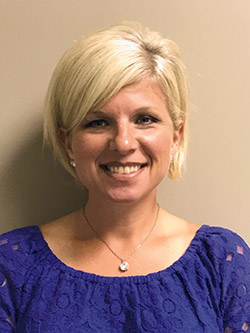At 15 years old, Chiasson worked every day after school at Associated Food Equipment and Supplies Inc., the Gulfport, Miss.-based company founded and owned by her aunt and uncle, Lonnie and Roberta Shelton. She graduated college from the University of Southern Mississippi with a degree in accounting and was well on her way to a successful career as director of finance for an area hospital.
 When the hospital closed, Bob Barnes and Steve Horlock lured Chiasson back to Associated Food Equipment to serve as the company's accountant. After she finished earning her master's degree, she decided to try her hand at sales and split her time between the two roles.
When the hospital closed, Bob Barnes and Steve Horlock lured Chiasson back to Associated Food Equipment to serve as the company's accountant. After she finished earning her master's degree, she decided to try her hand at sales and split her time between the two roles.
After Chiasson's customer count grew substantially, she transitioned into her current sales manager role. That was five years ago, and she hasn't looked back since.
In addition to managing her own book of business, Chiasson assists other salespeople in the company's Gulfport location. Her clients include hospitals, nursing homes, regional chains and independent restaurants.
FE&S: Why change it up from accounting to sales?
GC: I started doing sales a couple days a week. Then I started selling a lot, so I was doing sales during the day and accounting at night. I was told it was a waste of money to keep me behind the desk and that I could talk to a doorknob, which I guess was a compliment.
FE&S: How does your background in finance help in your current role?
GC: My accounting background helps me a lot. It helps me explain where we need to be as a break-even point. I understand the financials of the business when I'm developing new goals and in relation to increasing gross profits.
FE&S: You emphasize face-to-face customer service over email. Why?
GC: When you take the time to develop personal relationships with customers they don't think of anyone else when they need something. Nine times out of 10 when you develop that relationship, they're not questioning any price you're giving them, because they rely on your knowledge. When we're going up against the internet, I stress that we're offering customer service and, if something happens to their product, we'll still be here after the sale.
FE&S: How do you develop a good smallwares package for a new restaurant?
GC: First, I find out the operation's seating capacity and what the menu will be. I also ask what type of restaurant it is, such as a buffet or one offering a la carte service. We recommend they have 2½ table turns for their restaurant capacity.
FE&S: Why is working collaboratively with manufacturers' reps and other members of the supply chain important?
GC: We sell 10,000 different products, and they may sell only 20, so I rely on their knowledge and expertise. For example, I recently called a rep regarding a hood system, and they met with our client and me to answer questions. We have a choice like our customers do, so when our reps are there to support us and back us up, it strengthens relationships between us and the factory.



